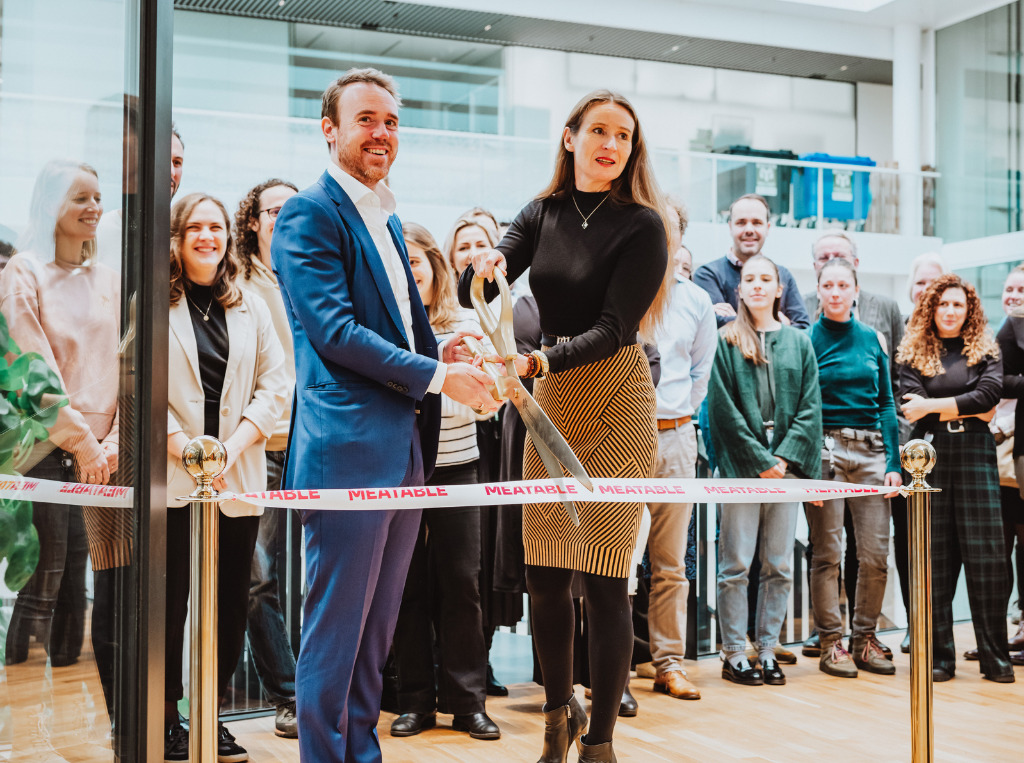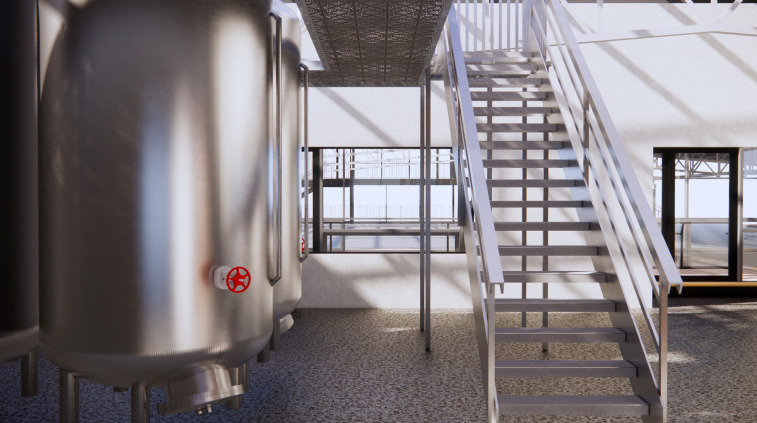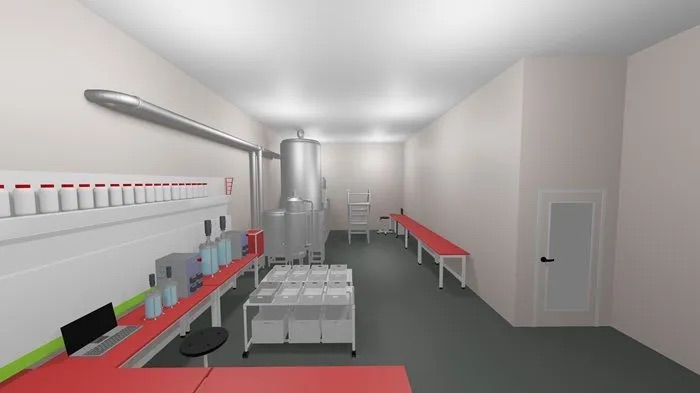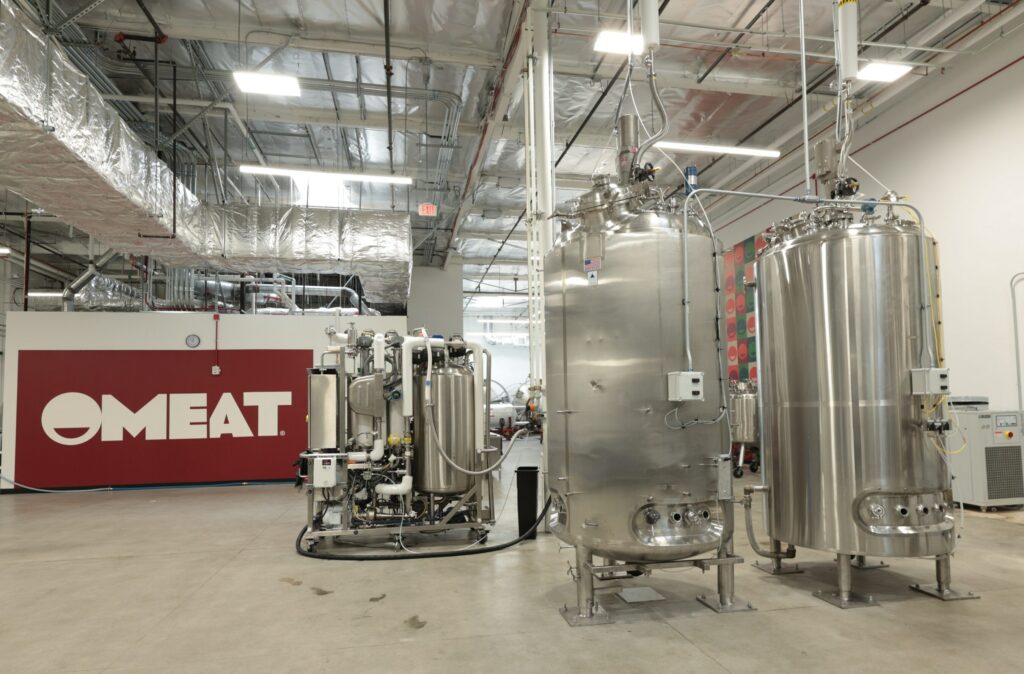
The cultivated meat sector is seeing a flurry of activity from startups announcing new production facilities across the globe, as teams work to accelerate the scaling and commercialisation of cell-cultured alternatives to conventional meat.
A handful of cultivated meat startups have made headlines with news of production plants and facilities across countries like Australia, China, Israel, Singapore, the US and Malaysia, despite recent reporting detailing scaling and funding challenges. A growing number of companies are advancing in their scaling plans with larger-scale factories, pilot plants and demonstration facilities. While some of these are already operational, others are under construction, and others still are at the planning stages, all are continuing to hit milestones and make progress.
Meatable’s new pilot plant

Dutch cultivated pork producer Meatable is having some year. In August, it nabbed $35M in a Series B round (taking total investment in the company to $95M). In October, it hosted its second cultured meat tasting of the year in Singapore, ahead of a planned 2024 launch. And now, to advance that very plan, it has opened a new pilot facility in its home country.
Its new pilot plant at the Bio Science Park in Leiden, the Netherlands spans 3,300 sq m (35,521 sq ft), which is double the size of its previous office and lab space. “In our previous location, we were working with 50-litre bioreactors, but here we have the possibility to work with larger bioreactors and therefore produce more product,” Meatable COO Carolien Wilschut told Green Queen last month. The new facility will be able to increase the bioreactor capacity to 200 litres, and potentially 500 litres.
“This is an important step for us in scaling up,” Wilschut added. The facility will expand Meatable’s ability to test and produce large volumes of cultivated pork in preparation for its foodservice launch next year in Singapore, where it has partnered with contract manufacturer ESCO Aster (the only approved cultured meat manufacturer in Singapore) as well as plant-based meat brand Love Handle to co-produce hybrid meat products.
The company has already applied for regulatory approval in Singapore – and is also looking into the only other country that has cleared the sale of cultivated meat. “In order to gain regulatory approval in the US, we’re working with the relevant US experts and authorities on this matter – including the US Food and Drug Administration and the United States Department of Agriculture,” co-founder and CEO Krijn de Nood told Green Queen in August.
On the new Leiden plant, he said: “It is fantastic to see how we have grown from an idea of two entrepreneurs five years ago into a mature company with a tangible product that can transform how we eat meat. In this new facility, we can further scale the company’s processes and accelerate commercial launch.”
Newform Foods’ demo facility

In South Africa, Newform Foods (formerly Mzansi Meat) – Africa’s first cultivated meat startup – has partnered with engineering giant Project Assignments on a demonstration facility, which is touted to be the largest of its kind in the continent.
The two companies are collaborating to design a blueprint to introduce Newform Foods’ B2B bioproduction platform globally. This model will enable food producers and retailers to expand their offerings by creating cultivated meat products “without the burden of intensive R&D and associated costs”.
The demo plant aims to showcase to food businesses how they can incorporate cultivated meat products into their existing facilities, facilitating and curating “a cell line of interest”, developing a prototype, and scaling the process.
“We want to create an end-to-end service from prototype to pilot and beyond, simplifying the journey from lab to market. We’re excited to be putting our plans into action, working with Project Assignments who are masters of their craft,” said Newform Foods co-founder and CEO Brett Thompson. “This will be an amazing opportunity to show the world what our bioproduction platform can do at scale.”
Newform Foods – which raised $130,000 in pre-seed funding last year – has already unveiled its cultivated beef burger and lamb meatballs, and plans to create cell-cultured mince, sausages, steaks, chicken and nuggets in the future, with a focus on meat cuts suited to classic African dishes.
Magic Valley’s co-manufacturing plant

Australia’s first cultured lamb producer, Magic Valley, has expanded into a new pilot facility at bio-innovator and incubator Co-Labs. The company – which debuted its lamb last year, followed by cultivated pork earlier this year – says the facility can help scale production capacity up to 3,000-litre bioreactors and produce up to 150,000kg of product annually.
“We are excited to embark on this expansion journey at Co-Labs, which will greatly amplify our
production capacity,” said Magic Valley CEO Paul Bevan, who said the establishment of the pilot plant “also reaffirms our position as a major player on the global stage”.
“It’s been amazing to witness the growth and development of Magic Valley during their time at Co-Labs and we’re committed to supporting their journey ahead for a more sustainable future,” added Co-Labs co-founder Andrew Gray.
Magic Valley collaborated with Washington-based Biocellion SPC earlier this year to optimise its production by enhancing its bioreactor design. The company says its cultivated meat products can emissions by reduce 92%, land use by 95%, and water use by 78% compared to their conventional counterparts.
Omeat’s pilot plant for cost-effective cultivated meat

Los Angeles startup Omeat, which launched from stealth mode in June, has completed the production of its 15,000 sq ft pilot plant. The new facility is part of the startup’s unique vertically integrated approach and can produce up to 400 tons of product annually.
The plant will deliver essential data and insights for scaling up production and ensuring quality, flavour and safety. Omeat says the completion of the plant will enable it to “demonstrate the intricacies of its process at scale, establishing a clear path for regulatory review and approval”.
In August, the startup – which raised $40M in an oversubscribed Series A round last year – launched its B2B arm by revealing it has already completed the first commercial sales of its ethical and affordable alternative to fetal bovine serum, Plenty, which is available to purchase for cultured meat producers.
“We’re pioneering a very unique farm-to-table approach that enables us to create delicious real meat with a fraction of the resources needed to produce conventional meat. It’s a more humane and sustainable way to satisfy the growing global appetite for meat,” said Omeat founder & CEO Ali Khademhosseini. “We remain confident that at scale, Omeat’s prices will be less than conventional meat, providing accessibility to high-quality protein worldwide.”
Cultivated pioneers face scaling challenges
It’s not all rosy, though. The only two companies to have earned US regulatory approval to sell cultivated meat – Upside Foods and Eat Just’s GOOD meat, both of whom are working on chicken– both previously announced industrial-scale facilities. The former broke ground on a 187,000 sq ft factory in Glenview, Illinois, which it says can eventually produce 30 million pounds of meat and seafood annually (Upside acquired cultivated seafood company Cultured Decadence in early 2022), while the latter had signed an agreement for a US facility that will house 10 250,000-litre bioreactors, which it says will be capable of making 30 million lbs of meat.
However, both companies are facing scaling and prouction difficulties. In two separate investigations by Wired, it was revealed that Upside Foods’ chicken served at San Fransico restaurant Bar Crenn wasn’t grown in bioreactors, but rather in non-scalable tiny bottles.
Similarly, Eat Just is allegedly in legal and financial trouble after failing to pay a number of its vendors, for which it has faced several lawsuits – this includes ABEC, the company commissioned to build those 10 bioreactors. As a result, co-founder and CEO Josh Tetrick says the company is no longer working on that bioreactor deal, or the facility they were meant to be housed in.
The post Cultivating the Future: A Wave of Cell-Cultured Meat Facilities are Popping Up Across the Globe appeared first on Green Queen.
This post was originally published on Green Queen.